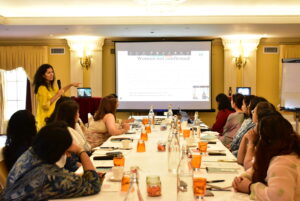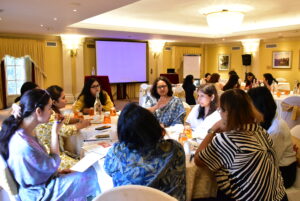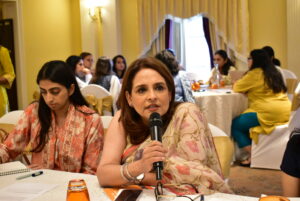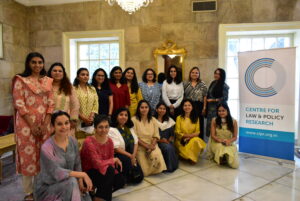
On June 28th, 2025, CLPR organised a Roundtable in Bangalore with senior women lawyers from the corporate bar to examine the emergence of a judiciary pathway for corporate women lawyers and address the challenges of securing gender inclusion within the judiciary. This is part of CLPR’s ongoing Equal Justice initiative to aiming to address the gender gap in the higher judiciary.
The roundtable began with a presentation by Senior Advocate Jayna Kothari (Executive Director, CLPR), on the key findings of CLPR’s research on judicial appointments in India. The data highlighted persistent gender disparities in judicial appointments to the Supreme Court and the High Courts, from low representation to the disproportionate exclusion of women lawyers. For women from the corporate bar, social attitudes, an opaque selection process and lower visibility in the High Courts contribute to the challenge. Jayna also spoke about the recent elevation of two male lawyers from the corporate bar, which signal a new opportunity for women from law firms to aspire to the judiciary.

The CLPR team then facilitated group discussions with the participants to delve deeper into strategies by which to support women corporate lawyers who may aspire to the judiciary, and systemic solutions to make the judiciary a viable pathway for them. The actionable strategies suggested by the groups were:
- Mentorship & support models for corporate women lawyers
- Accountability among law firms is key to push up younger women lawyers and ensure they do not give up the profession.
- Mentorship is important to create a culture of gender equality and inclusion, and cultivate the self-belief of women to aspire to leadership. This can be through:
- Enabling processes that accommodate women such as “work from home”. It is also important to harness technology to make this happen.
- Senior mentorship, where seniors guide juniors on what this career entails.
- Reverse mentorship, where young lawyers offer their perspectives to seniors on what can be changed.
- Firm support or structures enabling a judiciary pathway:
- Firms should provide exposure to the courts to corporate lawyers, even if they are not on disputes teams.
- They should help train young lawyers on how to network and provide opportunities for networking to promote visibility.
- It was also suggested that a specific mentorship/judiciary-track programme could be devised similar to the orientation or induction programmes.
- Accommodations for candidates pursuing judicial examinations (for lower judiciary).
- Briefing women counsels more actively.

- Making a judicial career a viable pathway to leadership for corporate women lawyers
- There is a need to change the definition of “practice” in the criteria for judicial appointments, to include not only High Court litigation practice, but also arbitration, tribunal, and regulatory experiences.
- A pre-judicial training academy, along the lines of prep centres for other careers such as IAS, should be instituted.
- To counter biases and assumptions among different groups of lawyers i.e. corporate, litigators etc., cross-sector partnerships should be instituted amongst bar councils, chambers of commerce and other legal fora. This will help bring various groups of lawyers together and foster networking and exchange of information.
- Gender diversity and transparency in judicial appointments
- There needs to be a platform for applications for judgeship, to ensure transparency and undo assumptions that women do not wish to be judges.
- Gender sensitization of judges and male peers is important to counter gender insensitive remarks and stereotypes in court language and decisions.
- Breaks in a lawyer’s career for caregiving such as maternity/paternity breaks should be adjusted with the tenure of a judge i.e. through a later retirement age.
- Reservations for women in the higher judiciary should be instituted.
- Increased engagement of senior counsels in the process of judicial appointments.

Outcome & Next Steps
The roundtable marked the first of many conversations on the role of corporate women lawyers within the bar and higher judiciary. Participants agreed to more actively begin these conversations within their firms, and contribute to platforms for interaction between corporate firms, independent litigators and the judiciary. CLPR will work towards facilitating the judicial reforms suggested through its research and public and institutional engagement.

